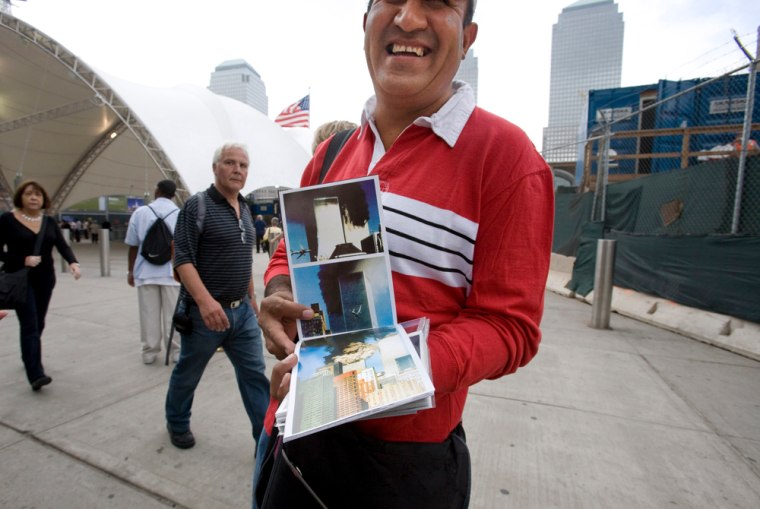Manuel Suarez’s job hasn’t earned him many fans. He keeps moving, to avoid catching the eye of the police. About 10 times a day, he is screamed at by strangers.
It’s a lot of fuss for a souvenir seller. But Suarez’s wares are Sept. 11 photo books sold to tourists at the World Trade Center site, and they spark an array of reactions as visitors see the images of smoldering ruins and pictures of people plummeting to their deaths.
People often accuse him of profiting off the dead. More often, however, they buy what he is selling.
The area around the trade center site is a popular tourist destination and has become an open-air market for everything from Rolex knockoffs and Sept. 11 figurines to photo books showing the destruction of the attacks.
For some victims’ families, the commerce is dismaying.
“To think that these people are coming here using this horrible disaster that our country suffered, to profit off it totally for themselves, is tasteless,” said Lee Ielpi, who lost his firefighter son in the attack and later co-founded the Tribute WTC Visitor Center. “It should not be a place where people come and make money on the dead.”
Technically, vendors are barred from the site, but enforcement is difficult. The Port Authority of New York and New Jersey, which is responsible for the area surrounding the construction, uses police sweeps to chase off hawkers, says spokesman Steve Coleman.
“The police are always after me,” says Suarez, 25. “They think we’re making money from this tragedy. But some people say it’s good, because we give people information that they didn’t know.”
Indeed, with the Sept. 11 memorial far from completion, there is little educational material around the site — and many tourists buy the photo books before leaving.
‘Profiting on the memory’
Alonso Bulle, visiting from Cancun, Mexico, collected a stack of several books, saying that one day he will show them to his son as a lesson in what can happen when people turn to violence.
“As long as this stays fresh in people’s memory, we can avoid it to happen again,” Bulle says, gesturing at the space where the towers once stood. “We came here to pay respects.”
For others, the souvenirs are a way to remember a New York unscathed by fear.
“That isn’t a reminder of the tragedy as such,” Berenice Caulfield said of the refrigerator magnet she bought to take home to Ireland. It shows the trade center’s twin towers standing tall. “It’s more of the glory of New York City.”
Whatever the type of memento, plenty of visitors are willing to buy. Across the street, 22-year-old Gabriel Sanya says he sells about 300 glass figurines of the towers each day, many of them engraved with the image of firefighters raising the American flag after the attacks.
“Somebody’s got to support the tourists,” says Sanya, who remembers watching the smoke produced by the attack when he was a junior in high school.
“It’s not profiting on the death,” he says. “It’s profiting on the memory.”
There are others who make a living selling visitors something less tangible.
Before the attacks, Harry John Roland sold picture frames and ash trays on the World Trade Center concourse, but now he returns each day to lectures tourists on the facts and figures surrounding the disaster, with a plastic jug filled with change and crumpled dollar bills hanging from his neck.
“I’ve got nothing but the facts!” he yells as he hands out maps of the site as it was. It’s more of a calling than a job, he says, adding that he takes home about $35 to $40 a day in tips.
‘A little opportunistic’
A few feet away, a white-bearded man with badly worn sneakers is sitting on the pavement and playing “The Battle Hymn of the Republic” and “God Bless America” on a flute in exchange for handouts.
Musician Philip Belpasso says the commerce at the site is healthy: “They say the dead are dead, and you’re supposed to concern yourself with the living.”
Of all that’s on sale at the site, Lee Ielpi objects most strongly to the illicit books, with those vivid, brutal images. He says books available nearby at the Tribute WTC Visitor Center retail shop provide an alternative, with historical context on the attacks and few direct images of suffering.
But even with earnings from the shop going to the nonprofit center’s educational programs, the keepsakes sold there make some people uneasy.
“It is kind of tasteless,” says David Herz, 40, looking at rescue dog dolls wearing tiny tribute center shirts and coffee mugs emblazoned with the center’s logo.
Herz, who lost a friend in the attacks, said the use of store proceeds for the visitor center’s fund “makes it a little better, but it has that air, somewhat, of being a little opportunistic.”
“To me, coffee mugs and T-shirts are something you get at Disney World,” he said.
